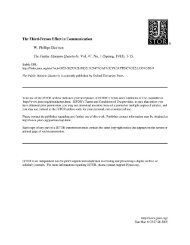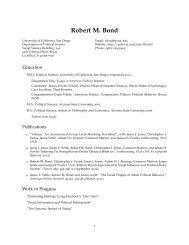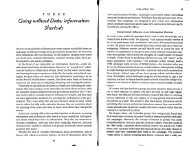Chapter 6 Why Authoritarian Parties? The Regime Party as an ...
Chapter 6 Why Authoritarian Parties? The Regime Party as an ...
Chapter 6 Why Authoritarian Parties? The Regime Party as an ...
You also want an ePaper? Increase the reach of your titles
YUMPU automatically turns print PDFs into web optimized ePapers that Google loves.
CHAPTER 6<br />
Table 6.1: A comparison of cooptation via tr<strong>an</strong>sfers <strong>an</strong>d cooptation via a regime party<br />
Tr<strong>an</strong>sfers <strong>Regime</strong> party<br />
per-period Current Expected Average<br />
<strong>Party</strong> r<strong>an</strong>k payoff r<strong>an</strong>k payoff lifetime payoff per-period payoff<br />
Senior<br />
Junior<br />
b−c<br />
2 b b b<br />
b−c<br />
b−c<br />
−c b−c 2 2<br />
of the party hierarchy on their incentives to defect. As in the setting without a party, the<br />
junior expects to receive b −c over the two stages of her career in the party <strong>an</strong>d therefore<br />
h<strong>as</strong> to be offered <strong>an</strong> average payoff of at le<strong>as</strong>t (b−c)/2 in each period in order to defect to<br />
the challenger. However, the senior now h<strong>as</strong> to be offered at le<strong>as</strong>t b – the benefit she will<br />
obtain from the incumbent in the current period – in order to defect to the challenger. Thus<br />
with a hierarchical <strong>as</strong>signment of service <strong>an</strong>d benefits within the party, the challenger must<br />
comm<strong>an</strong>d greater resources in order to replace the incumbent dictator th<strong>an</strong> if he were facing<br />
<strong>an</strong> incumbent without a party, b+(b−c)/2 > b−c. Or equivalently, the incumbent needs to<br />
comm<strong>an</strong>d fewer resources in order to deter the same challenger when he coopts via a regime<br />
party.<br />
Table 6.1 contr<strong>as</strong>ts the costs of coopting the two citizens with <strong>an</strong>d without a regime<br />
party. By <strong>as</strong>signing costly service to the early stages of party members’ career <strong>an</strong>d delaying<br />
the benefits of membership to the latter stages, the hierarchical structure of the party makes<br />
the incumbent dictator more resilient to potential challengers. Because they have already<br />
expended the costly service at the junior stage <strong>an</strong>d only expect to reap the benefits, senior<br />
party members have a stake in the incumbent dictator’s survival that is absent in a regime<br />
that coopts without the institution of the party, even if the latter spend the same resources<br />
15











